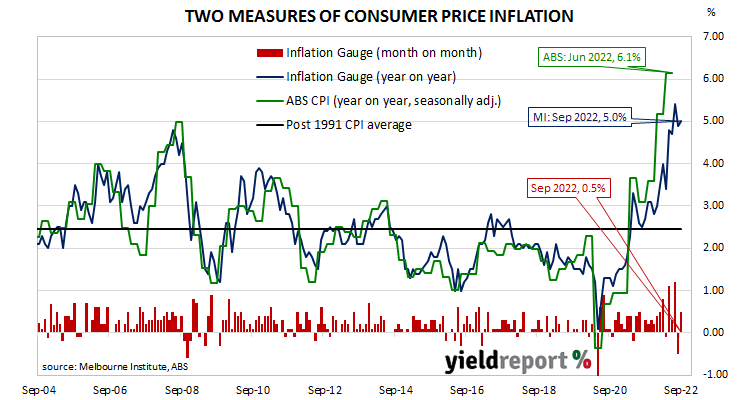Summary: Melbourne Institute Inflation Gauge index up 0.5% in September; up 5.0% on annual basis.
The Melbourne Institute’s Inflation Gauge is an attempt to replicate the ABS consumer price index (CPI) on a monthly basis. It has turned out to be a reliable leading indicator of the CPI, although there are periods in which the Inflation Gauge and the CPI have diverged for as long as twelve months. On average, the Inflation Gauge’s annual rate tends to overestimate the ABS rate by around 0.1%.
The Melbourne Institute’s latest reading of its Inflation Gauge index indicates consumer prices increased by 0.5% in September. The rise follows a 0.5% decrease in August and increases of 1.2% and 0.3% in July and June respectively. On an annual basis, the index rose by 5.0%, up from 4.9% in August.
Commonwealth Government bond yields moved modestly higher on the day despite sizable falls in US Treasury yields on Friday night. By the close of business, the 3-year ACGB yield had inched up 1bp to 3.68%, the 10-year yield had gained 3bps to 3.95% while the 20-year yield finished 4bps higher at 4.17%.
In the cash futures market, expectations regarding future rate rises firmed a touch. At the end of the day, contracts implied the cash rate would rise from the current rate of 2.31% to average 2.70% in October and then increase to an average of 3.085% in November. May 2023 contracts implied a 4.125% average cash rate while August 2023 contracts implied 4.135%.
Given the Inflation Gauge’s tendency to overestimate, the latest figures imply an official CPI reading of -0.2% (seasonally adjusted) for the September quarter or 4.9% in annual terms. However, it is worth noting the annual CPI rate to the end of June was 6.1% while the Inflation Gauge had implied a 4.6% annual rate at the time.


